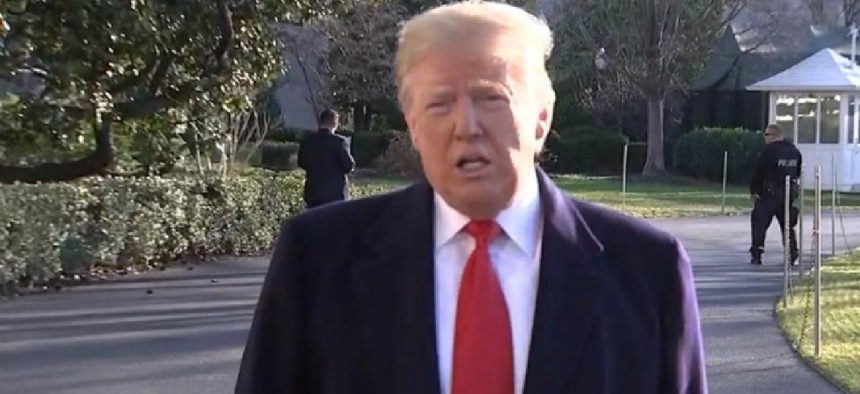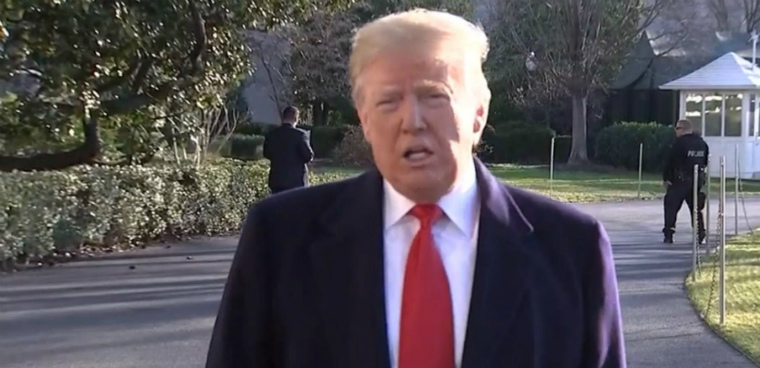Trump now expects 'serious talks' on shutdown

The president told reporters on Jan. 6 that he "can relate" to federal workers who are working without pay or furloughed and may miss at least one paycheck as a result of an ongoing partial shutdown of the federal government.

President Trump talks to reporters before boarding Marine One on the south lawn of the White House Jan. 6, 2019
President Donald Trump told reporters on Jan. 6 that he "can relate" to federal workers who are working without pay or furloughed and may miss at least one paycheck as a result of an ongoing partial shutdown of the federal government as Trump pursues a $5.6 billion appropriation for a border wall.
"And I'm sure that the people that are on the receiving end will make adjustment," Trump said on the South Lawn of the White House before Marine One departed for a staff retreat at Camp David. "They always do. And they'll make adjustment. " The president also claimed that "many of those people that won't be receiving a paycheck, many of those people agree 100 percent with what I'm doing."
There's no polling data to suggest that federal workers support the shutdown. According to a survey of feds by the Government Business Council and Government Executive, more than 70 percent of feds oppose the shutdown.
While White House negotiators including Vice President Mike Pence met with congressional Democrats on Saturday, both sides said no significant progress was made.
Trump is demanding a $5.6 billion appropriation for a border wall in order to approve broader funding bills. Democrats want to end the shutdown before negotiating the specifics of a border security package.
"We need to open up government and then negotiate, not the other way around," House Majority Whip Steny Hoyer (D-Md.) said on Meet the Press on Jan. 6. "Because we're prepared to negotiate, and we're prepared to have the Homeland Security bill approved for a short term so that we have to negotiate."
House Democrats are looking to step up pressure on Trump and Senate Republicans by passing individual appropriations bills to open up government departments one by one, so that specific functions like the processing of tax returns, applications for food stamps, loan applications can take place and so national parks can reopen with full staffing.
Also on Meet the Press, acting White House Chief of Staff Mick Mulvaney said the president wasn't looking for a wall across the entire southern border of the United States.
"Do we need it from coast to coast, 2,000 miles all the way across? No, and the president has admitted as such. There are places in the middle of nowhere where technology will be better," Mulvaney said.
If a deal takes shape, technology-centric border security could be a key factor. Hoyer noted that a topic in the weekend meetings was the fact that a DHS appropriation backed in the House and the Senate didn't support equipment to scan trucks that cross the border with Mexico into the U.S.
On Face the Nation, Senate Minority Whip Dick Durbin (D-Ill.) said that visa overstays were a numerically larger immigration problem than illegal border crossings.
"The solution to that is not a concrete wall," Durbin said. "It's a computer program that needs to track these people who have received the visas."
At the same time, Durbin said he didn't think a deal to end the shutdown was at hand.
"Well, I can't say that we're close because president's made it clear he doesn't care. He's prepared to see a shutdown for months and he even said years, and reaffirmed that before the cameras," Durbin said.
According to Trump, the ball is in the Democrats' court.
"We'll see how long the shutdown goes on," he said. "Look, this shutdown could end tomorrow, and it could also go on for a long time. It depends -- it's really dependent on the Democrats."



